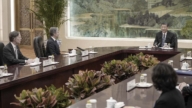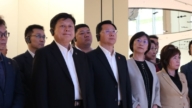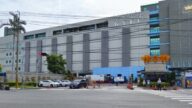【新唐人2011年7月25日讯】在中国有很多人因为发表对中共执政不满的言论,而被冠以“颠覆国家”的罪名并且被关押判刑。刑法“煽动颠覆国家政权罪”,就是中共当局多年来用来拘押异议人士的一个说法。但这条法律又与现行的宪法第35条相互抵触,法律界人士认为,“煽动颠覆国家政权罪”的标准已经完全背离了宪法,也背离了学术界对于公民言论自由权的认知。
在过去30年来,中共政府订定了许多的法律,其中不少是剥夺人民基本权利和自由的“恶法”,“煽动颠覆国家政权罪”就是其中一条。
1997年经过修订的《中华人民共和国刑法》第105条第2款中指出,“以造谣、诽谤或者其他方式煽动颠覆国家政权、推翻社会主义制度的,处5年以下有期徒刑、拘役、管制或者剥夺政治权利﹔首要分子或者罪行重大的,处5年以上有期徒刑。”
对此,法律界人士表示“颠覆”和“国家政权”,有很多基本概念的内涵和外延都没有明确界定,例如以和平方式集会、游行和示威是否构成“颠覆罪”,公民批评“官员腐败”,是否构成“颠覆国家政权罪”等等。
东南大学法学教授张赞宁:“颠覆那必须是有行为,有颠覆国家的行为,要有行为,再一个,还要看具体他做的是什么,讲了些什么,我觉得这个罪名有被滥用的可能。”
而中国宪法第35条又明确规定,中国公民有言论、出版、集会、结社、游行、示威的自由。显然这条宪法与刑法第105条第2款已经互相抵触了,法律界人士认为,任何一个法治的国家,宪法一定是大于刑法。
山东旭洲律师事务所主任舒向新:“宪法是母法,宪法大于任何的法律,不论是法律的制订或者是法律的贯彻来说,宪法的制订要更广泛、要更严格,因为刑法或者是民法,都是根据宪法才能进行制订的,他必须是不能违背宪法。”
刑法第105条第2款侵犯了现行宪法第三十五条所确认的“公民言论自由”的权利,学者表示这有两种可能,一个就是“司法解释有漏洞”,没有具体的解释,另一个就是“宪法被架空了”。
东南大学法学教授张赞宁:“这个可能跟我们的体制有一点点关系,首先我们的司法不独立,往往要受到其他的,政府啊、其他组织的干扰,所以我认为司法必须要独立,一个国家的司法不独立,那么这个国家的法律是虚伪的,就是假的。”
张赞宁进一步表示,一个国家的司法不独立、刑法被滥用,和“一党专政”有很大的关系。
东南大学法学教授张赞宁:“原因就是一党专政,这个要开放党禁、报禁,然后才有可能司法独立,如果党禁、报禁不开放的话,这个司法独立永远没有可能,永远不实行,就不可能有这个独立的司法。”
另外,因为反革命被判处八年徒刑的人权观察家秦永敏表示,当初他的罪名是“反革命宣传煽动罪”,也就是现在这条“煽动颠覆国家政权罪”,在这个换汤不换药的罪名下,中共可以把任何对政府不满的人加以判刑。
人权观察主席秦永敏:“所有的所谓煽动颠覆罪,在中国都是因为你仅仅说了,表达对这个实质政策的不满,提出了一些意见要求而已,并不存在什么,我想发达国家可能也有‘煽动罪’,那么在中国所谓的煽动罪,那就是纯粹因为他认为你的这个政治言论对他不利,甚至有时候荒唐到仅仅是和某一个地方基层的领导人发生争执,他都可以以这个‘煽动颠覆罪’来对你进行判刑。”
中国大陆法律界人士普遍认为,刑法105条,经常被用来对一些以和平非暴力行为,交流思想和观点的人士,进行刑事迫害,也就是用法律迫害他们的和平言论。
新唐人记者常春、黄容薛莉采访报导。
What Is The “Subversion” Charge For?
Many people criticizing the ruling Chinese Communist Party
(CCP) are charged with “subversion" and sentenced.
“Inciting subversion of state power" is from the Criminal Code
and has been used by the CCP authorities to detain dissidents.
But this code conflicts with Article 35 of China’s constitution.
Legal professionals believe that this charge
has completely deviated from the Constitution
and it disregards the recognition of the right to free speech
amongst academic community.
In the past 30 years, CCP’s government set a number of laws,
many of which deprive people of basic rights and freedoms.
“Inciting subversion of state power" is one of them.
In the Criminal Law amended in 1997,
Article 105, paragraph 2, notes that
“People using rumors, slander or other means to incite
subversion of state power and overthrow the socialist system,
will be sentenced up to 5 years of imprisonment,
criminal detention or control, or deprivation of political rights.
Leaders of major crimes,
will be sentenced over 5 years of imprisonment."
Legal professionals said, in “subversion" and “state power",
many concepts’ connotations and extensions are not clearly defined.
Will peaceful assemblies, marches, or demonstrations
constitute “subversion"?
And will criticizing “corrupted officials"
be regarded as a “subversion of state power"?
Zhang Zanning (Law professor atSoutheast University):
“It must be a subversive act to the State.
Moreover, it depends on what he has done or said specifically,
I think this indictment has possibly been abused.”
The Constitution stipulates in Article 35 that
Chinese citizens have freedom of speech, press, assembly,
association, march and demonstration.
Obviously, this is in conflict with Article 105,
paragraph 2 in the Criminal Code.
Legal professionals believe that in any country with a rule of law,
the Constitution must be superior to the criminal law.
Shu Xiangxin (Director of
Xuri Law Firm in Xuzhou, Shandong):
“The Constitution is the parent to other laws.
It has a greater force than other laws.
In making and implementing laws,
Constitution’s formulations should be more extensive and stringent,
because criminal and civil laws are developed under the Constitution.
And they must not violate the Constitution."
Criminal Code Article 105, paragraph 2, violates the rights of
“freedom of speech" stated in the Constitution’s Article 35.
Scholars think that there are
two possible reasons for that:
a “flawed judicial interpretation" without specific explanation;
and “the Constitution is a mere figurehead".
Prof. Zhang:
“This might be related somewhat to our system.
Our judiciary is not independent, and it is often subjected to
interference from the government and other organizations.
I think judiciary must be independent.
Otherwise, the laws of such a country are hypocritical and false.”
Zhang said that China’s judiciary is not independent;
and the criminal codes have been misused.
These are greatly related to the “one-party dictatorship".
Prof. Zhang:
“The reason is the one-party dictatorship.
We have to first lift the bans
on political parties and newspapers,
then it will be possible to have judiciary independence.
Otherwise, there will never be judiciary independence.”
Human Rights observer Mr. Qin Yongmin was imprisoned
for 8 years because of his counter-revolutionary activities.
Originally, he was charged with
“counter-revolutionary propaganda and incitement"
and later this was changed to
“inciting subversion of state power".
With this charge, the CCP could sentence anybody,
who is dissatisfied with the Chinese authorities.
Qin Yongmin:
“The so-called inciting subversion of state power
is simply someone expressing dissatisfaction with a policy
or giving some comments and suggestions, nothing more.
Maybe the charge also exists in developed countries.
But in China, the charges are laid simply because
the authorities think a political statement is made against them.
Sometimes, it can be even more absurd.
You can be charged because of a dispute with a local cadre.
Legal professionals believe that the Criminal Code 105 has
always been used to suppress peaceful dissidents.
In reality, China’s laws are used by the authorities
to suppress peaceful speeches.
NTD reporters Chang Chun, Huang Rong and Xue Li





























